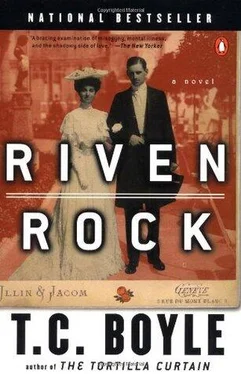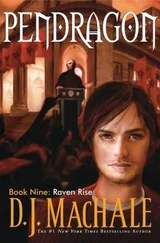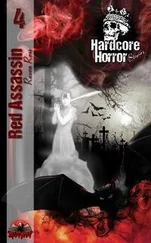T. Boyle - Riven Rock
Здесь есть возможность читать онлайн «T. Boyle - Riven Rock» весь текст электронной книги совершенно бесплатно (целиком полную версию без сокращений). В некоторых случаях можно слушать аудио, скачать через торрент в формате fb2 и присутствует краткое содержание. Год выпуска: 1999, Издательство: Penguin Books, Жанр: Современная проза, на английском языке. Описание произведения, (предисловие) а так же отзывы посетителей доступны на портале библиотеки ЛибКат.
- Название:Riven Rock
- Автор:
- Издательство:Penguin Books
- Жанр:
- Год:1999
- ISBN:нет данных
- Рейтинг книги:5 / 5. Голосов: 1
-
Избранное:Добавить в избранное
- Отзывы:
-
Ваша оценка:
- 100
- 1
- 2
- 3
- 4
- 5
Riven Rock: краткое содержание, описание и аннотация
Предлагаем к чтению аннотацию, описание, краткое содержание или предисловие (зависит от того, что написал сам автор книги «Riven Rock»). Если вы не нашли необходимую информацию о книге — напишите в комментариях, мы постараемся отыскать её.
Riven Rock — читать онлайн бесплатно полную книгу (весь текст) целиком
Ниже представлен текст книги, разбитый по страницам. Система сохранения места последней прочитанной страницы, позволяет с удобством читать онлайн бесплатно книгу «Riven Rock», без необходимости каждый раз заново искать на чём Вы остановились. Поставьте закладку, и сможете в любой момент перейти на страницу, на которой закончили чтение.
Интервал:
Закладка:
The car swung round a bend and all at once they were in the groves, running along between rows of orange trees, glossy copper-green leaves and the oranges hanging fat and sweet in every one, as if this were Christmas, endless Christmas, and every tree decorated just for them. Jim pulled over at the end of one of the long tapering rows, where the trees suddenly gave out and the open fields began, yellow mustard up to your armpits and some kind of hairy blue flowers struggling through the weeds and a riot of every possible thing reaching up out of the dirt — everything but oranges, that is. “Well,” Jim said, throwing out his arms, “what do you think?”
O‘Kane looked over his shoulder at the ranks of unassailable trees, and then out into the field. Jim’s white trousers were stained with flecks of yellowish mud. There were gopher mounds everywhere, and at least now O’Kane knew what they were. “I don’t know,” he said. “What am I supposed to think?”
“I guess it’s kind of hard to picture,” Jim said, wading out into the undergrowth, “but once we get this cleared out of here and give these trees some attention—”
“What trees? You mean”—a gesture for the grove behind them—“those aren’t the trees right there?”
Jim Isringhausen was bent over something in the deep grass. “Here, look,” he said.
O‘Kane saw a sapling no thicker than his finger, four feet tall maybe, with a puff of vegetation at the top of it. And then he saw the others, the smallest stunted flags of copper-green leaves poking out here and there from the morass of weeds. “That’s an orange tree?” he said, and even as he said it he understood how elusive a thing a man’s fortune could be.
Jim Isringhausen had straightened up, holding his hands out in front of him as he rubbed the dirt from them. “Yep,” he said, “that’s it. And before you know it these little beauties’ll be producing like their big sisters behind you.”
O‘Kane just stared at the place Jim had cleared in the weeds and the leafy stalk of nothing stuck in the middle of it like an arrow shot down out of the sky. Then he looked over his shoulder again, at the deep-green wash of leaves and the oranges hanging uncountable in the interlocking grid of branches that went on as far as he could see. “It’s going to take a while,” he said finally.
Jim didn’t deny it. “Yeah,” he said, working his heel against the running board to dislodge a clot of mud from his gleaming tan shoe. “But not as long as you think.”
After that, things began to go downhill, a long steady slide that was so gradual O‘Kane wasn’t even aware of it, not at first. It was as if everything in his ken — Mr. McCormick, Dr. Brush, Riven Rock, Mrs. Fitzmaurice, the hoarded whiskey and beer and Mart and Pat and the accrued weight of all those saved and salvaged dollars — was on an incline and the top end of it tipping up higher and higher every day. O’Kane gave Jim Isringhausen his life’s savings — and talked Mart into putting up a hundred and some odd dollars too, to round off the investment at an even three thousand. He’d stood in that overgrown field and looked at those sorry twigs and saw the whole thing unfold, the gophers ravaging the roots, the well run dry, Jim Isringhausen back in New York enthroned in some townhouse like J. Pierpont Morgan, the weeds dead and parched and fallen away to the faintest skeletons of what they were and the orange trees as barren and dead under the summer sun as the grainy yellow dirt itself. But he didn’t care. It was a chance, that was all. The worst chance, maybe, but he was tired of waiting, cored out with it, exhausted, worn down, reckless and mad and seething with self-hate and the blackest kind of fatalistic despair: throw a nickel in the ocean and see if it makes a splash.
He drank beer with the whiskey and when that ran out he drank the bourbon. He was sick in the mornings and his throat was dry through the afternoons, his sinuses clogged, his head throbbing. He drank the sloe gin and it tasted like some sort of liquefied tooth powder, and then he dug up the wine and drank that. There were bootleggers in town now, weasel-faced desperadoes who drove up from Mexico with tequila and mescal and Pedro Domecq brandy, but it was eight dollars a bottle, nine, ten, and what the local entrepreneurs were making out in the canyons was a quarter the price, even if it was just about undrinkable. What they called whiskey was grain alcohol diluted with tap water, colored with caramel and flavored with prune juice, and “Scotch” was all of the above with a dose of creosote added for taste and texture. It was like drinking strychnine, battery acid, toilet cleanser, but it did the trick, and O‘Kane resorted to it, a loyal customer, a daily customer, a customer whose hands shook as he tried to unfold the money and slip it into the palm of Bill McCandless from Lompoc or Charley Waterhouse from Carpinteria or Farmer Caty from God knew where. They ran the stills — they made the shit — and handsome Eddie O’Kane took it back to his room and drank it. Oh, once in a while he’d go up to Menhoff’s and order a hamburger sandwich and a ginger ale and sit there drinking ginger ale after ginger ale till the bottle in his back pocket was empty and somebody had to help him out the door, but mainly he just went to his room and stared at the walls.
And what walls they were. Mrs. Fitzmaurice had interred them beneath a thick fibrous covering of the cheapest grade of wallpaper applied with liberal quantities of glue over what must have been plaster, also liberally applied. These were not sheer walls, not by any means — they plunged, leapt, bulged, threw up a cordillera here, sank into the depths of a laguna there. The wallpaper pattern was meant to represent some sort of tubular flower, endlessly repeated in blue, violet and chartreuse, and if O‘Kane stared at it long enough, the flowers first became bells, then sausages, and finally, if he’d had enough Lompoc swill, severed heads, elongated in the most horrible and unnatural way. There wasn’t much furniture to obstruct his view — a washstand, bed, wardrobe, chair and table — but that was all right with O’Kane. He had the opportunity to contemplate furniture all day long at Riven Rock, room after room of it, the finest money could buy. He didn’t need to bring it home with him — and he didn’t need the encumbrance either. Possessions were for the rich, and he wasn’t rich and never would be — not unless Jim Isringhausen pulled off some sort of miracle.
Mrs. Fitzmaurice had graced his room with her chef d‘oeuvre, an ambitious four-foot-long-by-two-foot-high canvas that daringly intermixed puppies and kittens both in what seemed at first glance to be a demonic battle over the remains of a disemboweled kitten, but on closer inspection proved to be an innocent tug-of-war over a ball of yarn. This inspirational piece had pride of place on the wall over the bed, where O’Kane had to twist his neck to study it while lying there drinking and listening to the only record he had (a distant, hissingly ethereal rendition of “Semper Fidelis” that sounded as if it had been recorded in the locker room at Notre Dame). One wall was broken up by a window, another by the door; the third was an uninterrupted medley of bell-like and sausagelike flowers. His fellow boarders — there were eight of them, all in various stages of unhope and decay — strenuously avoided him, except at meals, when a certain degree of contact and even conversation was inevitable, but he began skipping meals and avoiding them in the hallways even before they had a chance to avoid him.
So it went, through the winter, into the spring and the parched, citrus-wilting summer. O‘Kane began to miss the odd day at work when the ersatz whiskey or Scotch or “Genuine Holland Genever” was especially bad and hit him so hard even the fillings of his teeth ached, and he didn’t like to do that, miss work, and he knew it was the beginning of the end of everything he’d ever struggled and hoped for, but he just couldn’t seem to muster the energy to care. And no one else seemed to care either. Brush was on the way out, even a blind man could see that. He’d stopped putting in regular hours altogether, and half the time when he did show up it was no more than a hello and good-bye for Mr. McCormick before he puffed and blustered his way out to the theater house and buried himself in his office. Mart was as thickheaded as ever, oblivious to everything, and Nick and Pat were putting on weight till they looked like twin bulldogs, asleep on their feet. And Katherine, the presiding genius of the place, was nowhere to be seen. She was a name in a newspaper clipping, Mrs. Stanley McCormick, running around the country with a bunch of birth control fanatics and blood-sucking feminists — now that women had got the vote and voted down drinking, they wanted to do away with babies too. And sure, why not — let the stork fly down out of heaven with them so women could spend all their free time smoking and griping and wearing pants.
Читать дальшеИнтервал:
Закладка:
Похожие книги на «Riven Rock»
Представляем Вашему вниманию похожие книги на «Riven Rock» списком для выбора. Мы отобрали схожую по названию и смыслу литературу в надежде предоставить читателям больше вариантов отыскать новые, интересные, ещё непрочитанные произведения.
Обсуждение, отзывы о книге «Riven Rock» и просто собственные мнения читателей. Оставьте ваши комментарии, напишите, что Вы думаете о произведении, его смысле или главных героях. Укажите что конкретно понравилось, а что нет, и почему Вы так считаете.












